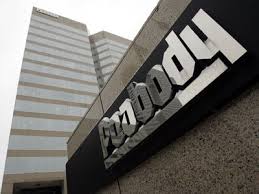 In 2015 Peabody Energy’s website featured a ticker showing its global coal sales for the year. Your could sit there and watch 500 tons of coal being sold each minute. That’s about 1000 tons of carbon dioxide that will end up in the atmosphere! 1000 tons of carbon dioxide is what is emitted by 200 average cars over a year, or the electricity usage of 131 homes in a year. And that’s how much coal it is selling each minute. You would need to plant 25,000 tree seedlings and watch them grow for 10 years, or change 26,000 light bulbs, just to offset one minute of Peabody’s coal sales.
In 2015 Peabody Energy’s website featured a ticker showing its global coal sales for the year. Your could sit there and watch 500 tons of coal being sold each minute. That’s about 1000 tons of carbon dioxide that will end up in the atmosphere! 1000 tons of carbon dioxide is what is emitted by 200 average cars over a year, or the electricity usage of 131 homes in a year. And that’s how much coal it is selling each minute. You would need to plant 25,000 tree seedlings and watch them grow for 10 years, or change 26,000 light bulbs, just to offset one minute of Peabody’s coal sales.
Before it filed for bankruptcy protection in 2016, Peabody Energy was the largest private-sector coal company in the world. It operated in 25 countries and had revenues of $7 billion. In 2013 it shipped 252 million tons of coal, 185 million from the US and 35 million from Australia.
Peabody Energy had mining operations in every major coal region in Australia, including thee mines in NSW and seven in Queensland. Peabody was also a member of the consortiums that operated coal loaders at Port Kembla and Newcastle.
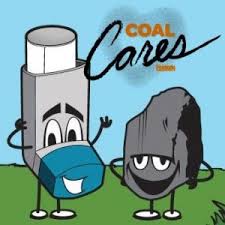 According to the Guardian newspaper, Peabody Energy was responsible for almost 1 percent (0.86%) of all greenhouse gases contributed by humans since the industrial revolution. The only non state-owned companies that have contributed more are oil companies like BP, Shell and ExxonMobil.
According to the Guardian newspaper, Peabody Energy was responsible for almost 1 percent (0.86%) of all greenhouse gases contributed by humans since the industrial revolution. The only non state-owned companies that have contributed more are oil companies like BP, Shell and ExxonMobil.
While governments tinker around trying to reduce the emissions of energy consumers by a very small percentage, whether with a carbon tax or direct action subsidies, fossil fuels are extracted from the ground in every increasing quantities with few if any regulatory measures to reduce extraction, even though coal is the largest single source of greenhouse gas emission on the planet. On the contrary, governments, like the Australian governments, have consistently encouraged coal mining and exports and have even subsidised it.
The reason that coal extraction remains unregulated is in no small part the result of the ability of companies like Peabody to use their financial resources to persuade communities that they benefit from coal mining and exports and to hire armies of lobbyists to persuade politicians—those who have not already been won over by political donations—that they should support rather than phase out their damaging activities.
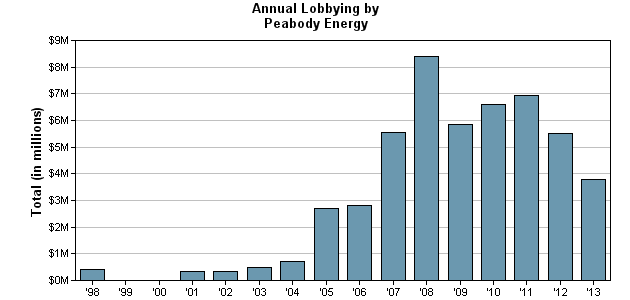
In 2014, with the help of the world’s largest PR company, Burson-Marsteller, Peabody launched a global campaign to persuade the world that they sell coal to help the poor by providing them with cheap energy or as they put it to build “awareness and support to eliminate energy poverty”. According to Peabody Energy Chairman and Chief Executive Officer Gregory H. Boyce, “Coal is a fundamental environmental solution when turned into electricity and synthetic natural gas at large scale”.
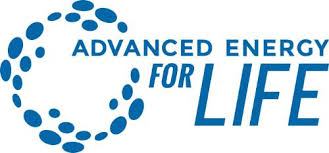 Labelled “Advanced Energy for Life” the campaign will include a so-called ‘education’ program that will highlight the “widespread benefits of inexpensive energy access and the vital role coal-fueled electricity can play in solving the world’s energy issues” as well as a research institute that will develop studies to support this claim. These company-commissioned studies will be used to promote government coal-friendly policies and oppose measures to reduce greenhouse gas emissions.
Labelled “Advanced Energy for Life” the campaign will include a so-called ‘education’ program that will highlight the “widespread benefits of inexpensive energy access and the vital role coal-fueled electricity can play in solving the world’s energy issues” as well as a research institute that will develop studies to support this claim. These company-commissioned studies will be used to promote government coal-friendly policies and oppose measures to reduce greenhouse gas emissions.
WWF filed a complaint to Belgium's Jury d'Ethique Publicitaire (JEP) against Peabody Energy's advertisement "Let's brighten the many faces of global energy poverty" claiming it:
• fails to disclose that the core of its operations is coal mining and supplying coal-fired power plants;
• claims that energy poverty is "the world's number one human and environmental crisis";
• claims that "clean, modern energy", meaning so-called advanced clean coal technologies, is "the solution for better, longer and healthier lives" misleading readers as to the negative climate, environmental and health impacts of coal pollution;
• uses absolute and misleading assertions such as "clean coal" that are not substantiated by relevant scientific evidence and commercial application. Clean coal has been largely discredited as a concept.
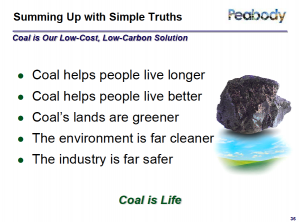 Peabody’s PR-inspired ‘concern’ for the poor of the world wantonly disregarded the IPCC assessment which made it clear that it is the poor and disadvantaged who will suffer most from global warming caused by the fossil-fuel products of companies such as Peabody. For these people the cost of coal energy is not cheap.
Peabody’s PR-inspired ‘concern’ for the poor of the world wantonly disregarded the IPCC assessment which made it clear that it is the poor and disadvantaged who will suffer most from global warming caused by the fossil-fuel products of companies such as Peabody. For these people the cost of coal energy is not cheap.
Damage to physical assets due to weather events and climate is well documented for poor urban settlements, often built in risk-prone floodplains and hillsides susceptible to erosion and landslides … In South and Central America, >630 weather and extreme events occurred 2000-2010, resulting in 16,000 fatalities, 46.6 million people affected, and economic losses of US$ 208 million … Equally important, albeit frequently overlooked, is the damage to human assets as a result of weather events and climate, such as food insecurity, undernourishment, and chronic hunger due to failed crops.
It is true that people in developing nations do need affordable electricity but the efforts of coal companies to get them hooked on coal does them no favours in the long term. It is like a drug dealer offering vulnerable young people a sample to get them hooked. There is already considerable pressure on developing nations like China and India to reduce their greenhouse gas emissions. It would be better for all nations if wealthier countries helped poorer ones to build infrastructure to harness the renewable energy sources that they have at their disposal rather than commit themselves to a dirty outdated energy resource like coal that they have to import.